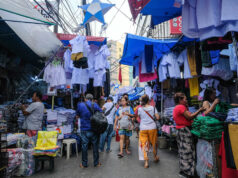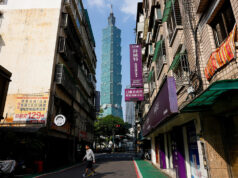PHL seen ‘insulated’ from virus fallout
THE PHILIPPINES is still relatively more “insulated” to risks arising from the spread of the coronavirus disease 2019 (COVID-19) compared with its regional peers, despite a recent spike in the number of local transmission cases, according to S&P Global Ratings.
In an online webcast, S&P Senior Economist Vincent Conti said the Philippines may likely most feel the impact of the virus from the investment side but will be able to withstand its impact.
“At least within the region, the Philippines is… at least relatively more insulated than the likes of say, Vietnam or Thailand,” Mr. Conti said on Wednesday.
“And the reason for that is foreign direct investment (FDI) is a small part of overall investment in the Philippines, in nominal terms, as the share of inward FDI is only about 3% of total,” he added.
Latest data from the Bangko Sentral ng Pilipinas (BSP) showed that FDI net inflows fell by 23.1% to $7.647 billion in 2019, from the $9.949 billion in 2018.
The FDI inflows exceeded the downgraded $6.8-billion target set by the central bank in November last year.
“Chinese inward FDI, in general, in most years is less than 3% of it,” Mr. Conti said.
Analysts had blamed global trade uncertainty, unclear path for the local tax reform and some regulatory risks as culprits for the weaker investor sentiment in 2019.
“Most of the impact (of the COVID-19) we will see from the investment growth side, which will be slower despite government efforts to keep up the infrastructure build, that’s because of the supply chain disruption [due to the virus],” Mr. Conti said.
According to the S&P senior economist, other experts’ research showed the virus outbreak will peak or last until the second quarter, possibly June.
While tourism is taking a beating from COVID-19, Mr. Conti said the Philippines is less reliant on the sector compared to other Asian countries.
“Compared with the likes of Thailand, for instance, and even Korea and Singapore, the Philippines tourism industry is not as important as the percentage of overall GDP (gross domestic product),” he said.
Estimates from the National Economic and Development Authority (NEDA) indicated a possible 1.42-million decline in foreign tourist arrivals this year, as its two biggest source markets China and South Korea are the most affected by the COVID-19 outbreak. NEDA estimated foregone gross value added for the tourism industry to hit around P93 to P187 billion this year.
Mr. Conti said the outbreak also has a “knock-on effect” on consumption and consumer confidence.
S&P last week downgraded its GDP growth projection for the country to 5.8% last week from the 6.2% it originally penciled in December. If realized, this would be slower than the 5.9% growth seen in 2019.
Earlier this week, NEDA Undersecretary Rosemarie G. Edillon said that they are now looking at a 5.5-6.5% GDP growth in 2020 due to the outbreak, from a previous target of 6.5 to 7.5%.
The Department of Health reported late Wednesday afternoon an additional 16 positive COVID-19 cases, bringing the total to 49.
RELIEF FOR BUSINESSES
Meanwhile, tax-collecting agencies are mulling possible relief measures for businesses affected by the COVID-19 outbreak, officials said.
Bureau of Internal Revenue Commissioner Caesar R. Dulay said the government’s largest tax-collecting agency is considering “targeted relief” for businesses reeling from the impact of COVID-19.
“Will consider but haven’t decided on how or when,” Mr. Dulay said in a mobile phone message. He did not elaborate.
For the Bureau of Customs (BoC), the country’s second-biggest tax-collecting body, its top officials will on Monday discuss possible measures for affected businesses, according to BoC Assistant Commissioner and Spokesperson Vincent Philip C. Maronilla.
However, Mr. Maronilla admitted that “limited din kasi ’yung relief na pwede namin ibigay (the relief measures we can give are limited) in terms of financial charges due to the government, but we are looking into some.”
Asked if the Department of Finance (DoF) has discussed any relief in terms of levies for affected sectors, Finance Secretary Carlos G. Dominguez III said he “never mentioned tax relief.”
Instead, Mr. Dominguez has instructed the Department of Tourism (DoT) and Tourism Infrastructure and Enterprise Zone Authority (TIEZA) to “creatively use their available funds” worth over P14 billion to support the tourism and travel sector, which has been battered the most due to travel bans, virus fears and canceled events.
“I never mentioned tax relief. We have asked DoT/TIEZA to creatively use their available funds (P14 billion) to support the tourism industry,” Mr. Dominguez told reporters in a Viber message.
At the same time, BIR Assistant Commissioner Elenita B. Quimosing said there are no plans to extend the April 15 deadline for filing of income tax returns, despite the rise in the number of COVID-19 cases.
“The commissioners really do not recommend extending the deadline for filing… We are saying that as early as now we have to do it early… It’s our obligation to file and pay taxes,” Ms. Quimosing said during a Palace briefing.
Meanwhile, Socioeconomic Planning Secretary Ernesto M. Pernia urged trade-related agencies to “ease implementation of some regulations that will allow firms to manage costs and provide financing or loan restructuring to micro and small enterprises whose operations may have already been affected.”
Finance Undersecretary Antonette C. Tionko earlier said various government agencies to continue to monitor affected sectors and companies to see how the state could “give them relief, in the event that this COVID-19 becomes very widespread.” — Luz Wendy T. Noble and Beatrice M. Laforga with G.M.Cortez



